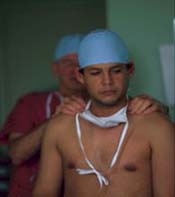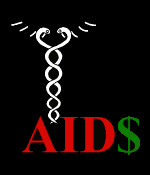
|
AIDS Treatment News
 On December 20, international trade talks in Geneva, Switzerland
failed to resolve the major remaining issue on access to generic
versions of patented medicines in developing countries to meet
public-health needs.
On December 20, international trade talks in Geneva, Switzerland
failed to resolve the major remaining issue on access to generic
versions of patented medicines in developing countries to meet
public-health needs.
All 143 other countries were ready to accept a compromise text negotiated on December 16. But the U.S. insisted on an additional restriction - to limit the agreement to AIDS, tuberculosis, malaria, and similar major epidemics. Cancer, heart disease, asthma, and hundreds of other illnesses would have been excluded. Developing countries would not accept this restriction, and European countries did not want to re-open the difficult negotiations. All treatment activists we have heard from think that the compromise, which was reluctantly agreed to by poor countries, would have been harmful. They feared that it would create a cumbersome process, easily open to obstruction, that would rarely or never be used to help anyone obtain medicine, while damaging some of the understandings in place. Some feared it could threaten or even end the historic consensus reached last year by the world's governments that trade rules should not be an obstacle to public health. Negotiations will start again in early 2003, attempting to reach agreement by February 11. Background
Current WTO rules allow a country to override a patent to meet a legitimate public need, under certain conditions, through a mechanism called compulsory licensing. But within a few years the existing rules may block export for compulsory licensing, stopping its use in any country not big enough and rich enough to have its own domestic pharmaceutical industry. The Geneva negotiations that just failed were called to deal specifically with this production-for-export problem. In November 2001 in Doha, Qatar, all the countries in the trade negotiations agreed that WTO rules would not prevent countries from taking measures to protect public health (the United States reluctantly signed on in order to keep the negotiations moving). Developing countries were promised that the export problem would be corrected in 2002, presumably in accordance with the Doha agreement. But several rich countries -- the U.S., Canada, Japan, the European Union, and Switzerland -- pushed for restrictions on behalf of their pharmaceutical companies. Developing countries this month were pressured to accept these harmful restrictions. But they drew the line at caving in to the disease limitation finally demanded by the United States. Shortly after rejecting the agreement, the U.S. said it would not bring action against certain drug exports while the talks continued. This statement was widely seen as a public-relations move unlikely to have any practical effect. For generic manufacturers must get drug approvals in each country, and deal with other time-consuming and expensive obstacles as well, before export can happen. They need stability and are unlikely to base business decisions on a unilateral statement designed to look good, but that can be taken back any time. For more information see news reports in the Washington Post ("Talks on Low-Cost Drug for Poor Nations Stall," by Paul Bluestein, December 21), The New York Times ("Trade Talks Fail to Agree on Drugs for Poor Nations," by Elizabeth Becker, December 21), The Guardian (UK) ("U.S. Wrecks Cheap Drugs Deal," by Larry Elliott and Charlotte Denny, December 21 -- which reported that Vice President Cheney apparently made the decision not to accept the compromise), The Wall Street Journal ("U.S. Retreats from Earlier Move to Keep Drugs from Poor Nations," by Michael M. Phillips, December 23), or other newspapers and wire services. For a more detailed description of the negotiations see Inside U.S. Trade ("TRIPS Draft Strikes Balance on Many Issues, but Isolates U.S. on Scope," December 20). Quotes
 "We're basically talking about a system that could help save
millions. If a good system isn't created, you can imagine a
world a few years from now where multinational companies control
the patents for everyone." (Ellen 't Hoen of Doctors Without
Borders, quoted in The New York Times, December 21.)
"We're basically talking about a system that could help save
millions. If a good system isn't created, you can imagine a
world a few years from now where multinational companies control
the patents for everyone." (Ellen 't Hoen of Doctors Without
Borders, quoted in The New York Times, December 21.)
"President Bush wants to argue that the diseases American children receive treatment for are off limits to poor children in poor countries, but they cannot win that argument." (James Love, director of the Consumer Project on Technology, quoted in The New York Times, December 21). "You have to ask yourself, are you going to have a patent system or not? If you're going to permit people to import drugs to treat cancer, diabetes and heart disease, what are you going to do when someone says, I want Viagra on the list?" (Unnamed U.S. trade official, quoted in the Washington Post,December 21.) Comment: Issues Needing Attention
We do not argue that pharmaceutical patents should be abolished, but that they involve unique social responsibilities -- which the multinational corporations have so far largely dismissed. If industry continues to obstruct instead of helping to build systems that work for people, it is our duty as citizens (of the United States especially) to prevent our government from being used as a tool by irresponsible corporations to bully others.

The Geneva negotiations that failed in 2002 will continue in 2003, writing rules that may become law all over the world for years to come. In developing these rules, everyone needs to be aware that we are near the beginning of an era of unprecedented progress in medicine. So far the great advances in biological understanding have been poorly translated into practical treatments, but that will change. Imagine the consequences if penicillin and all other antibiotics had been denied to most of the world for ten to 20 years for intellectual-property reasons; then imagine this happening again and again in cancer, Alzheimer's, diabetes, and other major diseases.
We can begin reform by asking researchers what real obstacles they face, what support they need to be effective, and how the systems must be changed.
AIDS Treatment News Published twice monthly Subscription and Editorial Office: 1233 Locust St., 5th floor Philadelphia, PA 19107 800/TREAT-1-2 toll-free email: aidsnews@critpath.org useful links: http://www.aidsnews.org/ Editor and Publisher: John S. James Associate Editor: Tadd T. Tobias Statement of Purpose: AIDS Treatment News reports on experimental and standard treatments, especially those available now. We interview physicians, scientists, other health professionals, and persons with AIDS or HIV; we also collect information from meetings and conferences, medical journals, and computer databases. Long-term survivors have usually tried many different treatments, and found combinations that work for them. AIDS Treatment News does not recommend particular therapies, but seeks to increase the options available. AIDS Treatment News is published 24 times per year, on the first and third Friday of every month, and print copies are sent by first class mail. Email is available (see below). Back issues are available at http://www.aidsnews.org/ To subscribe, you can call 800-TREAT-1-2 or 415-255-0588: |
 Traditionally patent laws were decided separately by each
nation, not by international organizations. And until about
1995, while patents on pharmaceuticals were widely recognized
among rich countries, they were not uniformly binding on
developing countries. But starting with the World Trade
Organization (WTO) treaty in 1995, almost every country on Earth
was pressured to sign on to a set of trade rules that included
pharmaceutical patents. These rules established deadlines for
developing countries, and required full compliance by 2006
(later extended to 2016 for least-developed countries). Patent
holders can set whatever price they want, and apparently no
thought was given to the fact that major corporations would
regularly price life-critical new drugs totally out of reach of
most of the world's people.
Traditionally patent laws were decided separately by each
nation, not by international organizations. And until about
1995, while patents on pharmaceuticals were widely recognized
among rich countries, they were not uniformly binding on
developing countries. But starting with the World Trade
Organization (WTO) treaty in 1995, almost every country on Earth
was pressured to sign on to a set of trade rules that included
pharmaceutical patents. These rules established deadlines for
developing countries, and required full compliance by 2006
(later extended to 2016 for least-developed countries). Patent
holders can set whatever price they want, and apparently no
thought was given to the fact that major corporations would
regularly price life-critical new drugs totally out of reach of
most of the world's people.